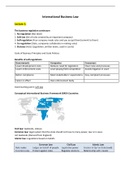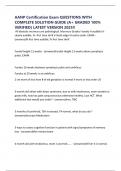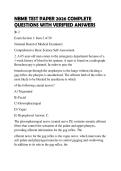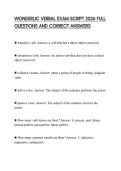Chapter 1
Law: The system of rules which a particular country or community recognizes as regulating the
actions of its members and which it may enforce by the imposition of penalties.
Justice: The moral conviction of a group of people expressed in law.
Functions of law
Substantive/Normative law: is composed of legal rules that define the content of just behaviour.
Formal law: legal rules that maintain substantive law/normative rules.
Public law: the law that regulated the relation between a government and its citizens.
- Public substantive law: The state oversees the enforcement of the law, and decides when a
citizen needs to be punished for not behaving according to its laws.
- Public formal law: formal rules that regulate the legal procedures that need to be taken into
account when a citizen misbehaves.
Private law: the law that regulates the relation between citizen or those who act as citizens. Also
between a citizen and company or between companies.
- Private substantive law: substantive rules that regulate the relation between the quarrelling
parties.
- Private formal law: rules to maintain the law are necessary.
Just: just implies a balance between the values ‘justice’, ‘opportuness’, and ‘legal certainty’
- Justice: the moral conviction of a given society expressed in law.
- Opportuness: the expression of effectiveness by a given society in law
- Legal certainty: the expression of legality in a given society.
Sources of law
- Natural law: in a natural law approach it is assumed that laws emerge from nature. This
means that a law does not need to be codified (written down) first to be a law, but already
exists regardless its appearances.
- Positivist law: in a positivist law approach, it is assumed that law comes forth from
codification. This means that law is only law when it has been written down first.
Natural and positivist law are two extremes, somewhere between we can find the most used sources
of law around the globe.
Legal sources
- Codified standards: codified standards are written rules produced by a legislator (a person
who makes laws).
o Treaties: a treaty is a written contract between two or more states who consider
themselves bound to its content relative to each other.
o Bilateral treaty: a bilateral treaty is a treaty to which two states are party.
o Multilateral treaty: a multilateral treaty is a treaty to which more than two states are
party.
- Application of law
o Case law: a chain of authoritative legal rulings in which the same reasoning pattern
of the court is applied in similar cases.
o Stare decisis: stare decisisis a legal principle in which courts have to follow the legal
reasoning as applied in previous cases.
, o Administration/executive: the branch in the public sector that executes the law
within the boundaries of its competences.
o Margin of discretion: the room allowed to the administration to execute the law at
theur own discretion.
- Legal writings and teachings
- Religious writings and teachings
o Non-secular state: a state in which governance and religion are mixed.
o Secular state: state in which governance and religion are seperated.
- Customary law
o Custom: an established and accepted legal practice.
Legal principle: a legal principle is a general value that applies in law.
Chapter 2.2
Legal systems: A legal system is a coherent collective of legal rules in which the same hierarchy of
legal sources applies, mostly determines by the boundaries of a state.
Legal families: a legal family is a group of legal systems that share the same basic characteristics in
law, including at similar hierarchy of legal rules.
- Civil law – In continental Europe beginning in the Middle Ages and based on codified law
drawn from national legislation.
- Common law – In England beginning in the Middle Ages and is based on case law and
precedent rather than codified law.
- Religious law – a religious system or document being used as a legal source, though the
methodology used varies (Islam: Sharia – Koran)
- New systems: Civil Law (Japan, Poland, China etc)
Blue: Civilian law countries
Red: Common law countries
, 1. Common law systems
A common law system is case law driven. The law is therefore predominantly developed by judges,
rather than a legislator or academics.
2. Civil law systems
A civil law system is driven by codified standards. The idea behind a civil law system is that a society
can be organized in a coherent way by adopting written codified standards.
3. Socialist law systems
A socialist system is driven by the administration. In essence, the law is produced by the state (the
administration) on behalf of all its citizens to create a society based on socialist principles. There is no
role for private law; one of the principles of socialism is that all means are collectivized.
4. Religious law systems
A religious system is driven by religious rules. It is non-scalar.
5. Traditional law systems
A traditional law system is driven by customary law; law consists of rules that come from “a general
practice accepted as law”.
6. Mixed systems
A mixture of legal approaches in one legal system.
Chapter 7
Two Ground-braking verdicts that European law us supranational:
- Directly applicable: each citizen may invoke European law effectively.
- Superior: European law is superior to domestic law.
In EU, the concept of free trade is organized in three main areas:
1. The four freedoms;
2. Harmonization of law;
3. Competition rules.
The four freedoms
- The free movement of goods: a ban on all fiscal restrictions, the elimination of all
quantitative restrictions to trade in goods.
- The free movement of persons: EU Member States enjoy the status of being a European
citizen who have the right to mov and reside freely within the territory of the Member
States.
- The free movement of services
- The free movement of capital
Harmonization of law
The European laws and policies on economics have been harmonized profoundly in order to ban
trade barriers. This is done on two levels:
- Primary legislation: treaties that are signed and ratified by the EU Member States. Most
important: TFEU = general fundaments of European economic integration.
- Secondary legislation: laws produced by the European legislature, based on and authorized
by the primary legislation.










